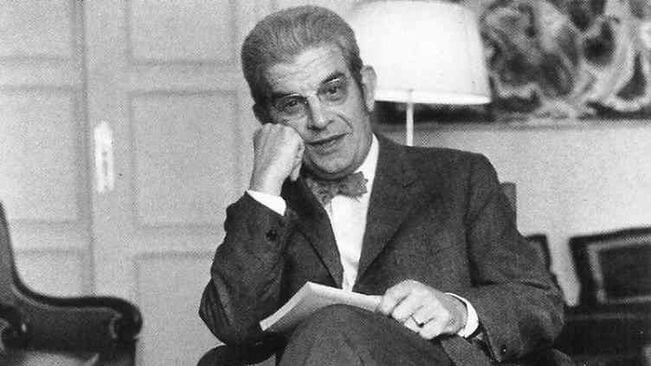19 Quotes From Jacques Lacan


Reviewed and approved by the psychologist Sergio De Dios González
Many of the phrases in this article from Jacques Lacan are a reflection of his own theories. In fact, his was one of the most complex, profound, and interesting perspectives of the 20th century.
Jacques Lacan was a French physician, psychiatrist, and psychoanalyst who chose to move away from orthodox psychoanalysis. He always claimed that his theses were a return to Sigmund Freud, but he also introduced new elements such as the theory of language and mathematics.
By its very nature, psychoanalysis isn’t a doctrine or a monolithic theory. As a matter of fact, some claim that there are as many approaches to psychoanalysis as there are psychoanalysts. Even so, throughout history, different schools, one of which is the Lacanian, have been formed.
To this day, Lacanian psychoanalysis continues to be the subject of debate. Without a doubt, it’s one of the most controversial in history. It’s also one of the most respected. Furthermore, we probably don’t even fully understand it yet. It’s certainly worth mentioning some of Jacques Lacan’s quotes that demonstrate his thinking. Here are some of them.
“ As Picasso once said, to the shocked surprise of those around him: I do not seek, I find.”
-Jacques Lacan-
1. Truth and deceit
Lacan’s quotes are sometimes contradictory. For example, he said that “Truth is the error that escapes deception and is achieved through misunderstanding“. This thinker believed that truth doesn’t circulate among people on a daily basis. It’s not that we intend to deceive each other, but rather that we don’t know our own truth. That’s why we can’t express it.

However, there are times when the truth ‘leaks out’, so to speak. When a mistake is made, for example. Or, when we speak without thinking. Apparently, this is the product of an error and gives rise to a misunderstanding. But, in reality, it’s the truth gradually appearing and shedding light on the situation.
2. The unconscious and language
Jacques Lacan was strongly influenced by the theory of language which was very much in vogue in the middle of the 20th century. In fact, Lacan added linguistic concepts to Freud’s classical psychoanalysis. One of his most important quotes was: “ The unconscious is structured like a language”.
For Lacan, the unconscious di, indeed, function as if it were a language. Therefore, he believed that to know and understand it, guidelines similar to those used to decipher a language should be employed. For example, dreams should be interpreted as metaphors or metonyms.
3. Love
Love was a recurring theme in Jacques Lacan’s quotes. His perspective on it was enigmatic and fascinating at the same time. One of his best-known quotes was: “Loving is to give what one doesn’t have”.

Lacan believed that love, as well as much of what we call reality, is a mistake. Love involves false promises. People compliment their partners to give them happiness. This commitment isn’t explicitly established but shines in the background of love relationships. That’s why Lacan claimed that we give what we don’t have.
4. Love and self-betrayal
Love, for Lacan, was a type of bond born from the word. If there was no word, all that would exist is falling in love which is an imaginary fascination. While sexual desire turns the partner into an object of satisfaction, love transcends it. It addresses the partner as a being, not an object.
We love, then, the very beings of our partners. We accept their failures and weaknesses. When love transcends the simple desire to be loved by another, it becomes an active gift. However, this love has a limit, which was established in one of Jacques Lacan’s phrases: “When the beloved moves far enough and perseveres in his deception of himself, love fails to follow him”.
Love means loving another being. But that being constantly betrays themselves yet still continues to love. However, when this betrayal goes too far, to the point that they become disfigured, the other’s love for them disappears. In other words, we stop loving those who betray and deceive themselves and, in effect, stop being those we used to love.
5. Relationship with the client
Another of Jacques Lacan’s quotes claimed: “I demand that you refuse what I am offering you …because it is not that ”. This sentence refers mainly to the relationship between a psychoanalyst and their patient. In fact, Lacan didn’t call them patients, but analysands, since he considered their position was active within psychoanalysis.

The analysand isn’t fully aware of what they’re looking for in psychoanalysis. The bond with the psychoanalyst takes different forms throughout the process. The words the analysand says aren’t the ones that describe their truth. Their words are what they offer in the process of psychoanalysis.
Lacan’s quote, therefore, is connected with the ethical position of the psychoanalyst. They reject what the analysand offers which is a mistake. In this quote, Lacan alludes to the psychoanalytic process and frames it as an ethical terrain.
6. Guilt and desire
Jacques Lacan’s quotes aren’t easy to understand. Moreover, many of them are convoluted and seem almost hermetic. Most don’t allow a literal analysis but suggest or refer to other meanings.
“The only thing of which we can be guilty is of having given ground relative to one’s desires” was one of his quotes that’s been interpreted in various ways. To understand this sentence, it must first be said that, for Lacan, guilt was on one side of the coin and responsibility on the other. he saw guilt as a reproach of the ‘super-ego’, as an irrational awareness of duty. He viewed responsibility as awareness of the true desire of the subject.
This quote means that, as long as desire isn’t conscious, guilt will always appear. Recognizing what we really want is an act of responsibility. If we take responsibility for our desire, we don’t deny ourselves or give in. Consequently, guilt disappears.
7. Fidelity
Fidelity is an eternal theme. Among Lacan’s quotes that refer to the subject, there’s one that’s extremely telling: “ Can there be anything that justifies fidelity, other than the word pledged? However, the word pledged many times is often pawned lightly. If he did not insist on it that way, it is probable that he was engaged very rarely”.

The word is the central axis in all of Lacan’s theories. This quote directly links fidelity to the word. It seems to suggest that loving fidelity is neither natural nor spontaneous. On the contrary, it’s only founded or begins to exist, if the commitment to be faithful is acquired through the word.
The couple shouldn’t assume that fidelity is a natural part of a relationship. Nor is it reasonable for them to pledge their word to be faithful if they don’t first analyze the real possibilities of fulfilling it.
8. Lack and love
Jacques Lacan said, “You can love someone not only because of what he has, but literally because of what they lack.”. Love is directed to the integral being of the other. To everything that they are and also to everything they’re not. We don’t love in ‘pieces’ or ‘parts’. Love is experienced by the whole being of the other.
In this quote, the key word is ‘literally’. In principle, it refers to the sexual differentiation of both genders. Men have what women physically lack: a phallus. At the same time, men don’t have what women do: the ability to bear a child.
Therefore, each one loves what the other lacks. The man loves the woman because she doesn’t have a phallus, in physical terms. The woman loves the man because he lacks her reproductive abilities. This explanation can also be transferred to the level of the symbolic.
9. Lacan and art
Art was another frequent theme in Lacan’s theories. He believed that, in psychoanalysis, the only unconscious defense mechanism that proves successful is sublimation. Through it, instinctive impulses are transformed into valid cultural products. He saw art, science, and all creative activity as the fruit of sublimation.

When faced with art, Lacan pointed out: “All art is characterized by a certain way of organizing around the void”. This means that the sublimated escapes consciousness. We don’t really know what it is. It’s something that can’t be expressed in words. It’s a void around which creation is organized.
Other outstanding quotes by Lacan
- “Man’s desire is the desire of another”.
- “The real is impossible”.
- “The patient knows everything and the analyst knows nothing”.
- “The only thing we all talk about is our own symptoms”.
- “It is only true inasmuch as it is truly followed”.
- “When one loves it has nothing to do with sex”.
- “There is something in you I like more than yourself. Therefore I must destroy you”.
- “What does it matter how many lovers you have if none of them gives you the universe?”
- “Love is pebble laughing in the sun”.
- “The object of man’s desire, and we are not the first to say this, is essentially an object desired by someone else”.
Although the phrases and theories of Jacques Lacan aren’t easy to understand, they contain a real depth of knowledge. In this article, we’ve tried to penetrate the enigma of some of his ideas. However, it’s clear that we’ve fallen far short of elucidating one of the most brilliant approaches to the human mind.
All cited sources were thoroughly reviewed by our team to ensure their quality, reliability, currency, and validity. The bibliography of this article was considered reliable and of academic or scientific accuracy.
- Caamaño, V. C., & Cochia, S. (2011). El amor según Lacan:“sucia mezcolanza” o “división irremediable”. In III Congreso Internacional de Investigación y Práctica Profesional en Psicología XVIII Jornadas de Investigación Séptimo Encuentro de Investigadores en Psicología del MERCOSUR. Facultad de Psicología-Universidad de Buenos Aires.
- Fernández, L. (2018). Sigmund Freud. Praxis Filosófica, (46), 11-41.
This text is provided for informational purposes only and does not replace consultation with a professional. If in doubt, consult your specialist.








